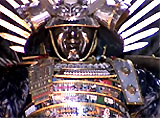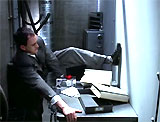
|
Brazil
(1985, UK)
In Terry Gilliam's eccentric, offbeat, satirical ultra-dark
comedy - it was a hybrid work, combining science-fiction, despairing
ultra-black comedy and fantasy. It was part of
a three-film "Trilogy of Imagination," also including Time
Bandits (1981) and The
Adventures of Baron Munchausen (1989).
The cult film told about an austere, oppressive and
repressive, polluted, decaying future dystopian world of conformity,
bureaucracy and Big Brother totalitarianism in a terrorist-threatened
Londonesque metropolis. One typical drone worker was harried by inefficiency,
malfunctioning machines, corruption, automation, and bureaucratic
mistakes. The film brutally satirized technology, bureaucracy, and
authoritarian societies controlled by state corporatism. The film's
poster tagline described:
It's all about flights of fantasy. And the nightmare
of reality. Terrorist bombings. And late night shopping. True love.
And creative plumbing. It's only a state of mind.
There were many visually-imaginative references to
Kafka's The Trial (and Orson Welles' The Trial (1962)),
Orwell's 1949 novel 1984 (and Michael Radford's 1984
(1984)), and Anthony Burgess' 1962 A Clockwork Orange (and
Stanley Kubrick's A Clockwork Orange (1971)).
It had other similarities to Fritz Lang's mechanized society in Metropolis
(1927), Kubrick's Dr. Strangelove:
(1964), and the 'book-burning' of Fahrenheit 451 (1966).
Gilliam's Orwellian fantasy film, with two Oscar nominations
(Best Original Screenplay and Best Art Direction) was made on a budget
of $15 million, and grossed only $9.9 million. A controversy over
its dark ending that had forced director Gilliam to cut about twelve
minutes from the 144 minute European theatrical version before its
general US release in 1986. Severe editing cuts proposed by the studio,
that emphasized the film's romantic themes and provided a happy ending,
threatened to change the message and tone of the entire film. However,
Gilliam was finally able to open his own 132 minute cut of Brazil in
late 1985 (the American release version).
- the film's inventive opening scene ("Somewhere
in the 20th Century") envisioned a stylized world of an
alternative, authoritarian future in a nameless European country;
it was characterized by ductworks that were advertised on television
by a slick salesman (John Flanagan) and a chorus: ("Central
Services. We do the work, you do the pleasure. Hi, there. I want
to talk to you about ducts. Do your ducts seem old-fashioned, out-of-date?
Central Services' new duct designs are now available in hundreds
of different colors to suit your individual tastes. Hurry now,
while stocks last, to your nearest Central Services showroom. Designer
colors to suit your demanding taste") - the advertisement
was interrupted by a violent explosion
- the main character was mild-mannered, low-ranking,
meek, bureaucratic civil servant Everyman Sam Lowry
(Jonathan Pryce) who as a technocratic statistician was stuck in
a tedious, mind-numbing civil servant job; he worked in the dull
regulatory Ministry of Information (MOI), jammed with paperwork
and filled with endless pneumatic tubes and ill-functioning equipment
- in one of the MOI government offices, a fly was
swatted at, causing it to fall into an office teletype printer
where it was squashed in the machine (it was a literal "bug" in
the system) - and a typographical print-out name-error was created on an arrest record; it
unjustly identified an innocent citizen (shoe repairman Mr. Buttle)
as the arrest target, instead of the real, suspected terrorist
Archibald "Harry" Tuttle
(Robert De Niro) - an illegal, renegade ("free-lance")
maintenance man
- on Christmas Eve, armed policemen 'dropped in' through
a hole cut into the ceiling, and invaded into the apartment of
the innocent Archibald and Veronica Buttle family (Brian Miller
and Sheila Reid) with two children to falsely accuse and brutally
assault the husband; it was a perfect example of technological-automation gone wacky and oppressive
bureaucratic muddling in the society's Ministry of Information; the
madness was further exemplified by this exchange when Mrs.
Buttle was required to sign multiple forms: ("That
is your receipt for your husband, thank you, and this is my receipt
for your receipt"); Archibald Buttle was wrongly arrested due to the mix-up and taken away in a
canvas bag - soon after, he died from heart issues
- Sam Lowry was selected (due to his mother's connections)
to investigate the case of the error of mistaken identity (and the
wrongful arrest and death of Buttle); Sam's supervising boss Mr.
Kurtzmann (Ian Holm) was upset that Mrs. Buttle's compensation check
was not properly deposited, so Sam was sent out to the Buttle home with her refund; during his visit with
the grieving and hysterical Mrs. Buttle, Sam met the Buttle's
upstairs neighbor - a tough female truck driver named Jill Layton
(Kim Griest), who had also become involved and frustrated as she
tried to report the grievous error to the inept, bureaucratic authorities
- Sam realized that Jill resembled the subject of his
many daydream fantasies, when he often imagined himself as
a lone heroic, silver-winged warrior knight-savior combating the technological
threats of the Machine Age; Sam was having recurring dreams
of soaring as a superhero with metal mechanical wings in the clouds
toward a mysterious, blonde fantasy dream-girl doppelganger (also Kim
Greist) - similar in looks to Jill Layton
|
Sam's Recurring Dream of Saving A Blonde Dream-Girl
|

|

|

Dream Girl Jill Layton (Kim Greist)
|
|
Sam Lowry (Jonathan Pryce) as a Winged Super Hero
|
- in an alley, Sam fantasized he was heroically saving
and rescuing Jill, by battling good and evil, in the form of baby-faced
mutants and a giant Samurai Warrior (Winston Dennis), comprised of
bureaucratic paraphernalia
- Jill's desire to help Mrs. Buttle sort out the
error regarding the wrongful arest and to find the real terrorist
target had caused her to become regarded as a suspected terrorist and
political dissident (and a possible associate of Tuttle)
- unexpectedly later, Heating Engineer repairman Harry
Tuttle arrived to fix Sam's complex network of AC ducts, and explained
how he hated paper-work: ("I couldn't stand the paperwork. Listen,
this whole system of yours could be on fire, and I couldn't even turn
on a kitchen tap without filling out a 27B/6. Bloody paperwork...
I came into this game for the action, the excitement. Go anywhere,
travel light. Get in, get out, wherever there's trouble. A man alone.
Now, they've got the whole country sectioned off. Can't make a move
without a form"); he had previously worked for the government's Dept. of Central Services,
but had become exasperated by its repetitive forms and time-wasting,
crippling paperwork, had quit, and had taken up work as an illegal freelancer
- as Tuttle recommended fixing Sam's repair issue by bypassing the problem duct area, two authorized,
government-employed Central Services workers Spoor (Bob Hoskins) and
Dowser (Derrick O'Connor) arrived to fix the AC; Sam helped Tuttle
to avoid detection and get away by stalling the two and asking for
their proper paperwork permission; as the renegade Tuttle left, he
exhorted Sam: "Remember Kid, we're all in this together!"
- in an effort to clear Jill's name, Sam maneuvered -
via the help of the connections of his high-ranking mother Ida (Katherine
Helmond) at a high-society party - to speak to Deputy Minister of
Information Mr. Eugene Helpmann (Peter Vaughan), to acquire a promotion to the "Information
Retrieval" Department; his intent was to access Jill's classified records
- Sam's vain and narcissistic mother Ida was under the
care of cosmetic surgeon Dr. Louis Jaffe (Jim Broadbent), and had become
obsessively addicted to plastic surgery to rejuvenate her face, and
was undergoing a grotesque procedure; another
face-disfigured, bandaged client Mrs. Shirley Terrain (Barbara Hicks),
who was seeing a rival doctor, told Sam: ("My
complication had a little complication, but Dr. Chapman says I'll soon
be up and bounding about like a young gazelle"); both women were
in a futile attempt to escape the
"ravages of time" and stay young
- in Sam's new cramped and tiny office in the Ministry
of Information Retrieval Department, Sam battled in a tug-of-war with
his moving desk that he shared with his cubicle-mate Harvey Lime (Charles
McKeown, the film's co-scriptwriter) on the other side of a partition
- Sam was able to access Jill's records, but
soon after, he was suspiciously warned by his friendly MOI official
Jack Lint (Michael Palin) about investigating too deeply; Sam was unaware
that the enviable Jack was unscrupulously involved in
torturing and interrogating government prisoners
- afterwards, the self-deluded Sam met up with truck driver
Jill and confessed his love to her; however, when they were at a mall,
a high-class restaurant was the scene of a terrorist bombing; the oblivious patrons
continued to consume their meals in the midst of dead bodies; the
society was often plagued by terrorist attacks and bombings, thought
to be committed by enemies of the state (although they could have been orchestrated by the state itself),
and Sam began to suspect that she was a terrorist bomber
- his own vain efforts to clear Jill's name caused him to be targeted, victimized
and wrongly aligned with the rebellion; he was arrested and briefly detained, becoming the subject of study by
the totalitarian regime
- at work, Sam's new boss Mr. Warrenn (Ian Richardson)
criticized his lack of work; at home, Sam discovered that the two Central
Services AC workers had taken over his home, ripped out and tangled
his duct works, and discovered Tuttle's unorthodox bypass solution;
Tuttle sought revenge with Sam against the two by switching their airhoses
with sewage hoses, to fill up their anti-contamination Hazmat-suits
with raw waste until they exploded
- he again met up with Jill outside his apartment and
deposited her at his mother Ida's unoccupied home for safe-keeping;
he kissed her before returning to his office to manipulate
and falsify Jill's records, marking her as deceased, so that she wouldn't
be arrested as a suspected underground accomplice; during an overnight
with Jill, Sam had sex with her, but then he was seized at gunpoint with her
- after being apprehended, Sam was told that he had committed
treason by improperly and abusively using his position to change records, and
that during Jill's incarceration, she had been killed for resisting
arrest; in the downbeat, disturbing and shocking conclusion,
the troublesome Sam was blamed for a string of terrorist bombings, and
for treason against the state
- Sam was detained and kept in confinement within a gigantic smokestack
dome; he was strapped into a torturer's chair in the middle of a circular
platform that was situated under the vast, dark dome; Sam was to be
questioned and tortured by two torture agents in white doctors' jackets
as the spritely tune Brazil played;
the white-coated technician who was wearing a pock-marked,
smiling baby mask approached to administer torture; Sam recognized
him as his friend-turned-sinister Jack Lint, accompanied by
the wheelchair-bound Deputy Minister of Information Mr. Helpmann
- suddenly Sam was triumphantly rescued by a band of armed commandos led by terrorist
Tuttle - the renegade (freelance) air-conditioning engineer; Jack
was shot dead, and Sam with other freedom fighters escaped down
the steps of the Ministry Building before it was blown up [Note:
The sequence paid homage to the Odessa Steps sequence in Sergei
Eisenstein's Battleship Potemkin (1925)]
- during Sam's flight from police with Tuttle, he
imagined Tuttle's body completely covered with littered scraps
of paperwork from the demolished building that adhered to him before
he disappeared; Sam also found himself at the funeral of his mother's
close friend Mrs. Terrain who had died after botched "acid treatments"
of her face by rival plastic-surgeon Dr. Chapman (Jack Purvis);
in contrast, due to her repeated treatments, Sam's mother resembled
Jill in her 20s, and ignored Sam due to the attention she was receiving
from scores of young admirers; the funeral ceremony was disrupted
by government agents, and Sam fell into the black darkness of Mrs. Terrain's open casket
- Sam emerged in the street with the police and other
monstrous creatures in pursuit; to escape, he
climbed up an immense pile of used AC flex-ducts, opened a door,
and found refuge in Jill's tractor-trailer; reunited with her,
Jill and Sam drove away from the city to a pastoral setting - a happy ending
- however, his ideal perfect and illusory idyllic paradise free of societal restrictions
was revealed to be a self-deluding fantasy of wishful thinking -
his escape to a green vista in a pastoral backdrop was covered
over, and he found himself back in a chair within the domed torture chamber
- the film's final lines came at the moment of Sam's
complete insanity; the two torture agents, Lint and Deputy Minister
of Information Mr. Helpmann, peered into the face of the catatonic
Sam (and the camera), and commiserated about Sam's untreatable
condition: (Mr. Helpmann: "He's
got away from us, Jack." Jack Lint: "Afraid you're right,
Mr. Helpmann. He's gone"); the spritely tune Brazil played
- the film's final image was of the smiling Sam humming
the film's theme song to himself (Ary Barroso's "Aquarela
do Brasil" or "Brazil")
- insanely lost in his own inner world
|

Bureaucratic Error: An Arrest Order for Buttle, not Tuttle

Real Terrorist "Harry" Tuttle (Robert De Niro) - a "Freelance" Maintenance
Heating Engineer


Sam's Dream of Battling Against a Giant Samurai


Grotesque Plastic Surgeries For Sam's Narcissistic, Socialite
Mother Ida Lowry (Katherine Helmond) and Her Friend Mrs. Terrain (Barbara
Hicks)

The Chaos of a Restaurant's Terrorist Bombing

In His Cramped Office, Sam's Tug-of-War Battle Against His Co-Worker (On
the Other Side of the Cubicle Wall) For a Shared Desk

Sam's Dream-Rescue by Tuttle

Sam's Dream of Escaping with Truck Driver Jill
|











